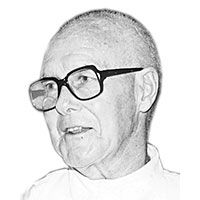Vocation

November 25, 2006 | 12:00am
 There will be a Vocation Seminar tomorrow, Sunday, November 26, from 8:00 a.m. to 5:00 p.m. at THE GARAGE, Sonolux Building, in the campus of the Ateneo de Manila, Quezon City.
There will be a Vocation Seminar tomorrow, Sunday, November 26, from 8:00 a.m. to 5:00 p.m. at THE GARAGE, Sonolux Building, in the campus of the Ateneo de Manila, Quezon City.
It is designed for male college students and for young professionals who are looking for the place where God wants them in this world. This Seminar concentrates on those who are thinking about becoming a priest or a Brother in a religious order.
Young Jesuit Scholastics, seminarians who are not yet ordained priests, will present the ways that Iñigo Loyola suggests, when you are trying to make up your mind. Loyola himself was a military man, and went through this agony of decision, debating whether to continue as an Officer in the Army of Spain, or to become a priest.
The young Jesuit will portray what the Jesuits do, and how they do it. And they will describe the stages in the long road of Jesuit formation. For information on this, phone 426-61-01; or E-mail: vocprom@visa.com; or consult website www.jesuits.ph
The seminar is for gentlemen only. People wonder, sometimes, why there are no lady Jesuits. There are Dominican nuns – but no Jesuit nuns.
The answer is: the virtue of the Jesuits is supposed to be: obedience. And Loyola discovered that women find it very hard to obey. This truth is known even on Broadway. In "My Fair Lady" Professor Heggins says, and sings:
"Never let a woman in your life!
She will ask you for advise.
Your reply will be concise.
She will listen very nicely,
then go out and do precisely
what she wants!"
A vocation seminar is a big help. The priesthood is a vocation. Becoming a brother is a vocation. Marriage is a vocation. Remaining single, to do a job that God wants you to do, can be a vocation. But God talks to you – he talks to every one of his children – in his own way. He tells you where he wants you to go, and what he wants you to do.
With me, it began when I was seven years old, in Grade Two, in Saint Mary’s parochial school, in Elizabeth, New Jersey. The nun was talking about the missions. That struck me as pretty good. So I began saying: "I will be a missionary!" This was before I ever thought of becoming a priest, and before I even heard of the Jesuits.
I won a high school scholarship to Saint Peter’s Prep in Jersey City, which was taught by Jesuits. In first year high, one of our teachers said: "Five thousand years from now, New York will be a hole in the ground. Pythons will be moving up and down where Broadway is now. All the buildings will be gone, including all the banks, and all the money in the banks. The gold will be melted. The paper will be burned. But, five thousand years from now, you will be living with God."
Sitting at my desk in the classroom, fourteen years old, very conscious of the smell of burnt soap from the Colgate Palmolive Peet factory close by, I thought: "Wow! That’s true! No matter what I do, some day I will have to stand all alone before God and be judged. And what then?"
It was the thought of eternity. I would live forever, in heaven or in hell. A swift, short life, and then eternity forever and ever! The Principal of the prep, who had the idea that I would be a priest, said to me three times: "What doth it profit a man if he gain the whole world and suffer the loss of his immortal soul?"
But what moved me most deeply was not the thought of death and judgment. It was life! In high school, a boy thinks with his eyes and ears. The one I wanted to be like, if possible, was Ernest P. Hartneth, S.J., a young Jesuit Scholastic. He was in charge of the school magazine. When I submitted my first story, he liked it. He talked to me as if he and I were running that magazine.
He was also the moderator of debating. I belonged to the debating society for four years. He was always positive. He never said a negative word. We knew we were not the best speakers in the world, but he pointed out every good argument we presented, saying: "That’s beautiful! Let’s develop that!" Under him, we never lost a public debate.
And he directed dramatics. One night, when the cast was leaving the theater after rehearsal, at about nine o’clock, he said: "Jim, what time is your train?" I was touched that he even knew that I was coming to school by train from another city. I looked at my schedule, and said: "Eleven". He said: "Ah, you don’t want to sit in that cold station for two hours!" He took me to the faculty house, and served me cocoa and cookies.
He never said a word about vocation, or the Society of Jesus. But I was thinking: "Of all the men I know, I would like to be like him!" So I entered the Jesuit Novitiate.
In high school I had been very successful. So I guess I came into the Novitiate with the idea that I was someone special. The Novitiate removed that illusion, completely. We had an exercise called "Lapidatio" -stoning. The novice kneels in front of all the other novices, his back to them. Each one presents the faults of the novice being "stoned", what makes him hard to live with. After that, you have both feet on the ground.
This happens in all religious orders. Once six Jesuits were martyred in the Dominican Republic. But there were seven priests in the community. The seventh was traveling. In Singapore other Jesuits said: "How lucky you were! If you had been there, you would have been killed!" The Jesuit hung his head, and said: "I was not worthy".
When I told that to a Carmelite priest, he said: "Well. . . . among the Carmelites you don’t have to leave the community to be martyred." It is true that religious tell the truth to each other. They are tough on each other. But that’s a blessing!
I volunteered for the missions. The mission assigned to the Jesuits in New York was the Philippines. Our novitiate sent three men a year. When the appointments came out, it was a list of eight names – three to go, and five possible alternates. I was number eight.
I prayed, and my family prayed, even my Dad. He said: "Boy, you will go. Because I am praying. And there is more joy over one sinner doing penance than over 99 just who do not need penance". . . . . Six of those ahead of me had various difficulties. I ended second. And I came to the Philippines. .. . . . I would guess that this is where God wanted me to be.
At Sacred Heart Novitiate in Novaliches, I was very close to Father Horacio de la Costa, S.J., who was then 22 years old. He loved his country, and he loved Manila. On that Christmas, my first Christmas in the Philippines, he wrote:
I do not think the Three Wise Men
Were Persian Kings at all.
I think it much more likely they
Set sail from out Manila Bay
In answer to the call.
And though the great historians
May stare at me and frown. . . .
I still maintain the Three Wise Men
Were Kings from my hometown!
And if you ask why I affirm
That Melchor was King of Tondo
When Gaspar ruled Sampaloc
And Baltazar Binondo.
We will not argue. We will walk
The streets on Christmas Eve,
And I will show you the poor man’s rafter
Where hangs the star the Kings sought after
High above Christian prayer and laugher . . . . .
You will set it, and believe.
For when they crossed the sea again
From Bethlehem afar. . . .
They lost their camels in the sea
And they forgot the Christmas tree
But they brought back to you and me
The secret of the Star.
During World War II I saw the tremendous courage of the Filipino. . . . . .their capacity and their willingness to suffer. . . . .their durability. . . . .their love for each other. . . . .and their loyalty. The Filipino is a man with a Star.
The only time I ever hesitated about becoming a priest was during the eight day retreat before I was ordained. I was praying over the terrible responsibility of a priest. . . . .people coming to him and placing their lives in his hands. All through the twelve long years of preparation I did not worry about this. But when the Bishop was going to say: "You are a priest forever!"–then I was scared.
I woke in the middle of the night, feeling: "I can not do it. I am not up to it. I am not worthy of it. . . .. Shall I go to the Rector right now, and tell him? Or shall I wait till morning?" . . . . .I wanted till morning. But then came meditation, and Mass, and breakfast, and sunlight. Walking after breakfast, saying my rosary, I decided to rely on God. He can work through any priest, no matter how weak that priest is.
I have never regretted entering the Society of Jesus. I have never regretted becoming a priest. I have never regretted coming to the Philippines. I pray constantly to be worthy of the good people whom
God sends to me. And I thank him for every moment of the beautiful life that he has given me.
It seems to me that we, the priests, are the spoiled children of God. He gives us so much! Even if there was no heaven, and no hell. . . . even if there were no ten commandments. . . . .and even if there were no voices . . . . . living the way God wants us to live in the surest way to peace, happiness, love – everything that is beautiful and good.
The great grace is finding the place where God wants you to be. That is what this vocation seminar -tomorrow in the GARAGE – is all about!
BrandSpace Articles
<
>
- Latest
- Trending
Trending
Latest
Recommended

























